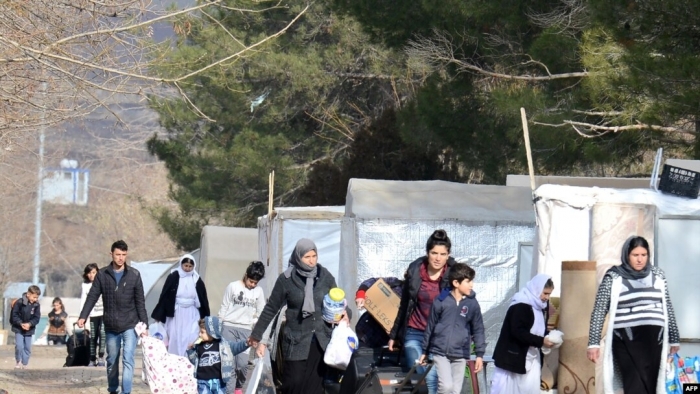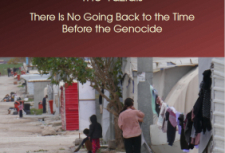Obstacles to the return of the missing yazidis

Part-1
Lack of information:
The military victory over ISIS and its defeat from various regions of the Middle East in 2017 did not lead to the identification of all the missing, and they were not returned to their families, as the fate of many of them is still unknown.
During captivity, the Yazidis were deliberately and forbidden to various parts of Iraq or Syria to prevent escape and liberation, and many of them were sold and transported to different countries. Many of those in captivity did not know where they were held.
Yazidis who managed to escape and return to Iraq, usually through sporadic and individual efforts of rescue groups and families, came from locations in Idlib and Jarablus in Syria, Mosul in Iraq.
Yazidis are held in camps for women and children affiliated with ISIS, such as Al-Hol camp in northeastern Syria, as well as detention centers in Syria and Iraq for men and boys who fought with ISIS against their will.
There are statistics on the number of kidnapped and returned Yazidis in the Dahuk Rescue Office in the Kurdistan Region of Iraq, but without knowing the number of Yazidis who were killed by ISIS because their fate is still unknown, this made it difficult to know the exact number of the missing Yazidis. Attempts to open mass graves throughout Iraq by the governments of Iraq and the Kurdistan Region of Iraq with the support of the UNITAD team and the International Commission on Missing Persons (ICMP) are necessary but often encounter difficulties. This means the lack of coordination between the various actors, the lack of a central database of DNA samples, and that Yazidi families are often required to give samples in multiple locations, and this is what makes it difficult as there is a general lack of clarity about the processes that they must go through to identify family members. During exhumation. In December 2020, the United Nations Committee on Enforced Disappearances expressed concern about the large number of unidentified bodies and mass graves in Iraq and recommended that Iraq establish a national database of disappearances.
Lack of a cross-border coordination mechanism:
It requires exchanging information, searching for missing and detained Yazidis, and ensuring that those who wish to return to Iraq can do so. This requires cross-border coordination between the authorities of different countries.
Rescue operations are very sensitive:
Even a short delay in the process and work can result in lost contact with missing persons. As the survivors faced problems during rescue operations that could have been avoided through better coordination, such as preventing them from entering the Iraqi borders when trying to return from Syria, and this is what happened with some survivors and survivors.
The governments of Iraq and the Kurdistan region established a “Committee to Search for Abducted Yazidis” in June 2020. This initiative is commendable, but lacks any practical measures, so far the committee has not met nor does it include representatives of the community whose service it claims is the Yazidi community, and most importantly the survivors. ISIS survivors and families of the missing.
Tags: #yazidisinfo #newsyazidi #aboutyazidi #humnarights
Obstacles to the return of the missing yazidis

Part-1
Lack of information:
The military victory over ISIS and its defeat from various regions of the Middle East in 2017 did not lead to the identification of all the missing, and they were not returned to their families, as the fate of many of them is still unknown.
During captivity, the Yazidis were deliberately and forbidden to various parts of Iraq or Syria to prevent escape and liberation, and many of them were sold and transported to different countries. Many of those in captivity did not know where they were held.
Yazidis who managed to escape and return to Iraq, usually through sporadic and individual efforts of rescue groups and families, came from locations in Idlib and Jarablus in Syria, Mosul in Iraq.
Yazidis are held in camps for women and children affiliated with ISIS, such as Al-Hol camp in northeastern Syria, as well as detention centers in Syria and Iraq for men and boys who fought with ISIS against their will.
There are statistics on the number of kidnapped and returned Yazidis in the Dahuk Rescue Office in the Kurdistan Region of Iraq, but without knowing the number of Yazidis who were killed by ISIS because their fate is still unknown, this made it difficult to know the exact number of the missing Yazidis. Attempts to open mass graves throughout Iraq by the governments of Iraq and the Kurdistan Region of Iraq with the support of the UNITAD team and the International Commission on Missing Persons (ICMP) are necessary but often encounter difficulties. This means the lack of coordination between the various actors, the lack of a central database of DNA samples, and that Yazidi families are often required to give samples in multiple locations, and this is what makes it difficult as there is a general lack of clarity about the processes that they must go through to identify family members. During exhumation. In December 2020, the United Nations Committee on Enforced Disappearances expressed concern about the large number of unidentified bodies and mass graves in Iraq and recommended that Iraq establish a national database of disappearances.
Lack of a cross-border coordination mechanism:
It requires exchanging information, searching for missing and detained Yazidis, and ensuring that those who wish to return to Iraq can do so. This requires cross-border coordination between the authorities of different countries.
Rescue operations are very sensitive:
Even a short delay in the process and work can result in lost contact with missing persons. As the survivors faced problems during rescue operations that could have been avoided through better coordination, such as preventing them from entering the Iraqi borders when trying to return from Syria, and this is what happened with some survivors and survivors.
The governments of Iraq and the Kurdistan region established a “Committee to Search for Abducted Yazidis” in June 2020. This initiative is commendable, but lacks any practical measures, so far the committee has not met nor does it include representatives of the community whose service it claims is the Yazidi community, and most importantly the survivors. ISIS survivors and families of the missing.
Tags: #yazidisinfo #newsyazidi #aboutyazidi #humnarights

























